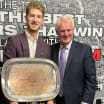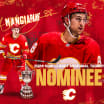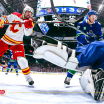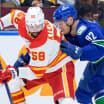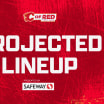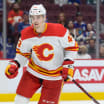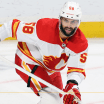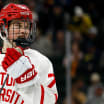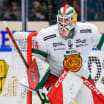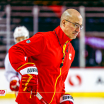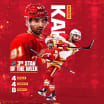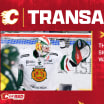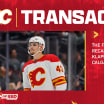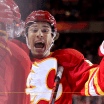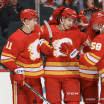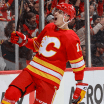With over 10,000 hotel rooms and guest-bedrooms overbooked in season, the tiny medieval Swiss town of Kitzbühel, nestled cozily along the river Kitzbuhler Ache, swells to double its normal size.
James Bond author Ian Fleming once lived there. World famous for its skiing attracting an international celebrity clientele, the World Cup races held on the adjacent Hahnenkamm, colourful gingerbread-style chalets and the majestic 650-year-old St. Catherine's Church, Kitzbühel is of those picture-postcard-pretty little Austrian towns that actually delivers the standard tourist-board hype.
"It is,'' says Pierre Page, one of its 1,800 actual dwelling-owning inhabitants, "so beautiful.
Pagé cherishes tenure in Calgary with Flames
Pierre Pagé still involved with hockey 20 years after run with Flames
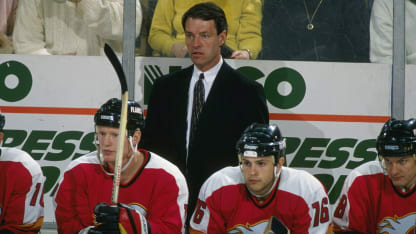
By
George Johnson @GeorgejohnsonCH / CalgaryFlames.com
"You eat better, live better, fresh air - no pollution. Naturally beautiful.
"A kind of heaven on earth, really."
Almost 20 years have passed since Page, uber-intense, fiercely loyal, left the Calgary Flames for the second time.
"We love Calgary,'' says Page on this day, while visiting family in the Maritimes. "We always thought of it as a kind of a home away from home for us.
"My daughter Lauren was born there in 1986 and over the years she'd ask: 'Where's home, daddy?' And I'd say: 'I don't know, dear. Home is where the next job is."
Despite other NHL gigs in Minnesota, Quebec (as coach-GM) and Anaheim, Page remains inextricably tied to the Flames, of course. First an assistant to Al MacNeil and Bob Johnson as the franchise relocated from Atlanta in 1980, to being in charge of the organization's minor-league affiliates in Colorado (AHL) and Moncton (CHL).
By 1986, he'd returned to Calgary to join Badger Bob's staff as the Flames made their famous, improbable push to the 1986 Stanley Cup finals.
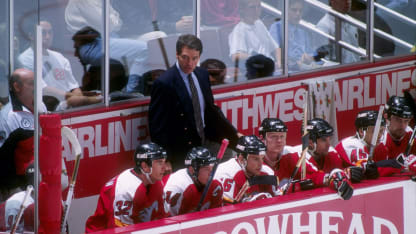
© Glenn Cratty /Allsport
He'd also serve as head coach of the Flames from 1994 through 1997, tumultuous years between the Dave King and Brian Sutter eras. Theo Fleury was at his playing apex then, Joe Nieuwendyk was traded away and a kid name of Jarome Iginla arrived to begin an unprecedented run at the Saddledome.
The past 17 years have been spent consulting, coaching and administrating overseas, away from the bright lights and intense scrutiny of the NHL, plying his trade in tourist-travel-guidebook destinations such as Lugano, Switzerland, Berlin and Munich, Germany and Salzburg, Austria.
"People think I just disappeared off the face of the earth or was off on holiday somewhere,'' Page muses.
"Well, just to clear that up: I was working.
"There's actually more pressure to win in Europe than back home because people there are less patient, believe it or not."
In 1999, a year after being cut loose by the Ducks, he began the European adventure, accepting a job with Ambri Piotti of the Swiss league.
During the nomadic years, Page would pilot the Berlin Eisbären to a pair of DEL titles and Salzburg Red Bull to two more in Austria, 2008 and 2010.
The landscape was new, and decidedly unlike anything the NHL had on offer. The 4,600-seat rink in Berlin when Page started there, the Eisstadiom, was located on the Eastern side of the demolished Wall. A series of tunnels ran underneath the facility were used for athletes to train on the hush-hush for Olympic Games.
Page's communications guy, Rudiger, was once the head of the anti-terrorist unit ("this guy,'' said Page at the time, "knows where the bodies are buried"). One of his assistant coaches, Hartmut Nickel, was former KGB and the father of PR man Donny Goldstein had survived two concentration camps and the death march.
"The most satisfying year of my career in Europe, of my life, was 2004-2005 in Berlin because it was the first time I'd won in a long time,'' he reflects.
"You know in your heart that you're capable of winning but having that reinforcement of actually doing it …
"And it's tough to win. Anywhere. So many factors are out of your control. Sometimes you're not in charge or the person in charge is under pressure. The mandate never changes, though: Develop players, play an exciting style and win.
"And even if you do all those things, at the end of the day the owner's still asking you: 'Are we making any money?'
"In 2004-2005, we did everything. At the beginning of the year the president of the club wanted to cut the budget by 20%. I talked to Peter Lee, our general manager and pleaded against that.
"So the owner, Mr. (Phillip) Anschutz, a very busy man, flew in with all his finance people and we had a meeting. I said: 'Mr. Anschutz, I want to do something really special here.' And he said: 'So do I.' He was actually in Berlin to close this real estate deal, bigger than Potsdamer Platz.
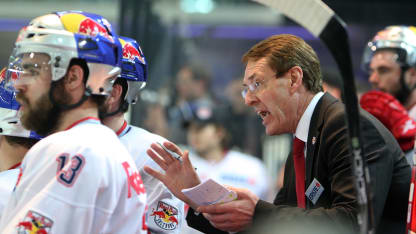
© Mathias Kniepeiss/Getty Images
"Anyway, he listened to us and at the end, stood up and said: 'This is my money, isn't it? Maybe I should do what I want. Let's see what these guys can do with my money.'
"We won the championship.
"I spent nine years with Red Bull, six in Berlin with the Anschutz Group and they were great years."
During his working life there, he was able to witness a growth in the game and a rising popularity.
"For a long time, we just didn't have the best athletes choosing hockey. That's what got us around the corner: Starting to convince those athletes to come and play our sport.
"The first choice before had always been soccer, and in Austrian skiing and ski-jumping.
"In Canada, we all think we're great coaches but we're lucky to work work with the best athletes because they choose hockey.
"If you're gifted you can play anything. Tennis. Golf. Gretzky's 14-year-old son started to play golf and in seven months he was a scratch handicap. His daughter, 11 years old, took up tennis and apparently she's going to be a star. For sure.
"Some people just are naturally gifted. Like Kent Nilsson. A natural."
Ah, yes, the magical, maddening Magic Man.
"Did you know I hired him in Salzburg?'' laughs Page.
"He told me for 20 years he wanted to be a coach, so I finally said yes."
And …?
"And,'' is the amused reply, "it was a challenge. I wish I would've hired Helen, his wife" - an LPGA Tour golfer.
"You know Kenta, he'll never change."
In 2014, after turning the job down once before, Page took on the role of Global Hockey Sports Director of the $60 million Red Bull Academy in Salzburg, one of four such developmental facilities worldwide (New York, Leipzig, Germany and Brazil being the others).
This past February, midway through his first year coaching in Munich with Red Bull, he was replaced by former Oiler defenceman Don Jackson.
Which leads us to today.
When reminiscing about Calgary years that agonizingly-close '86 push to the final, a six-game loss to the Canadiens, remains a bittersweet moment.
"All I remember,'' he laughs, "is losing 11 in a row during the regular season. And that Bob (Johnson) never got mad, never swore, never raised his voice, during that stretch. Not once.
"The last game we lost in that streak was 8-1 or 9-1 to Hartford, at home. And in the press conference afterwards I remember all he'd talk about was the one goal we scored. We're looking at each other like 'What the hell's going on?'"
"During that run, Cliff (GM Fletcher) told us he wouldn't make any changes until the guys righted the ship. Then after the 11-game streak, we couldn't lose. We made the playoffs and then beat Edmonton.
"Unfortunately, we dropped Game 6 of the St. Louis series and I think that cost us the Stanley Cup. That crazy Game 6 … we were up 5-2 and lost in overtime. I really believe we were better than Montreal but losing that game cost us four days rest. And we needed it."
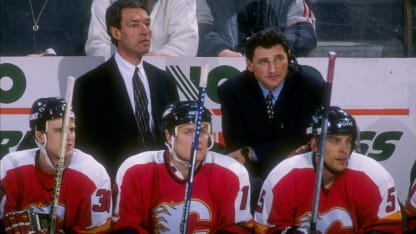
© Harry Scull /Allsport
And his three-year run as head coach at the Saddledome?
"We could talk all day about that. But for me, if you look what happened, it marked the beginning of cutting back on talented players. Somebody at the top decided to change the mentality to more defence. You really started to see scoring go down.
"Down. Down. Down.
"And it's not true that defence wins.
"We made the playoffs my first two seasons and then missed out. Brian Sutter came in and missed the playoffs three years in a row.
"Nieuwendyk was traded during my time there, (Al) MacInnis was already gone and my second year Gary Roberts didn't play, he was hurt. Similar to my problems in '93-94 (in Quebec) when (Joe) Sakic held out, (Owen) Nolan didn't show up. All of a sudden it was negotiation time, Quebec was holding tight and a lot of wrong decisions were made."
Page was GM of the Nords when Eric Lindros shunned them at the 1991 NHL Entry Draft.
He would subsequently trade the 2016 Hall of Famer to Philadelphia for Peter Forsberg, Ron Hextall, Steve Duchesne, Mike Ricci, Chris Simon, $15 million and two first-round draft picks.
That deal secured a bright future for the franchise that would become the Colorado Avalanche.
"My first reaction: He didn't break any rules,'' reasons Page a quarter century later. "Secondly, he was a helluva player.
"He didn't want to come to us because he didn't want to play in a small market. We offered him $50 million over 10 years, more money than he made in Philly.
"We copied the Herschel Walker model when we made the trade. When Herschel Walker was traded from the Dallas Cowboys to Minnesota, Dallas wound up winning two Super Bowls.
"John Elway did the same thing as Lindros, right? The only difference is, Elway won two Super Bowls in Denver. And when the (Nordiques) moved to Colorado, they won two years there without (Lindros).
"But he was, as a I said, a helluva player."
After being released by Munich, Page has spent the last seven months authoring a book, not for publication, for himself, titled: How To Win In Three Years.
At 68, still full of energy and ideas, he's now on the lookout for fresh challenges.
"I don't mind whatever role I'm asked to play, as long as I can help somebody win.
"Where? That's not important. Who with, that's what important. You have to find an owner who isn't afraid to change the mentality, the culture. The easier thing to do is to copy.
"To be successful, whether you're Apple or a hockey team, you have to do something different, think different."
Exactly what Pierre Page did back in 1999, when he embarked on his extended European sojourn.
"You know,'' he says in reflection, "the NHL is great. The best players, the best league in the world. But I've never regretted the path I took.
"These last 15 best years have been the best years of our lives.
"It's been an incredible ride."

